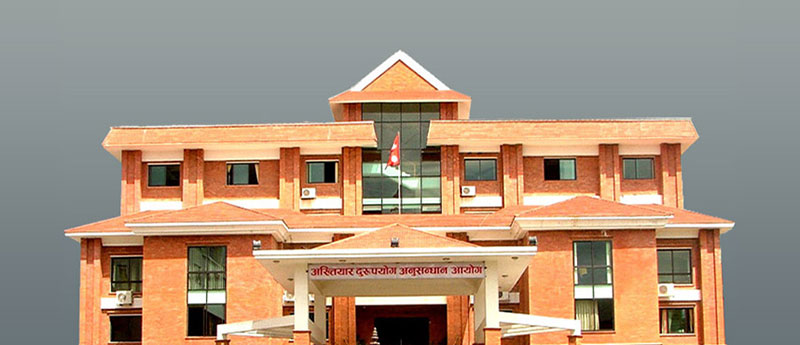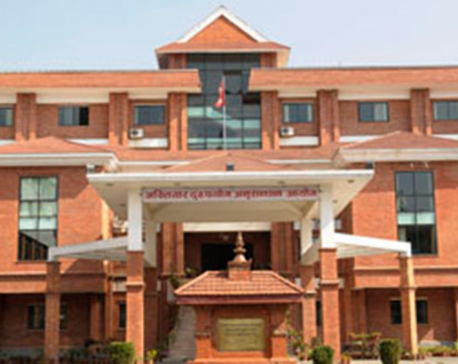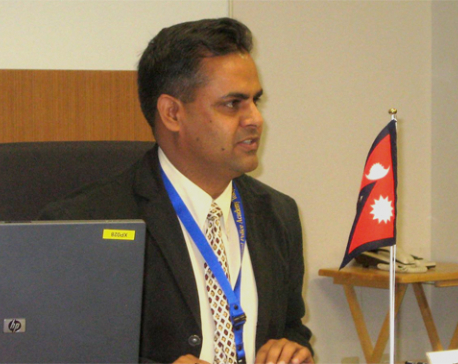
OR

The task of removing Lokman Singh Karki should not be equated with halting investigation into political corruption
While CIAA chief Lokman Singh Karki was on his way back into the country from abroad 157 MPs had quietly lodged an impeachment motion against him in the parliament. The process was completed before Karki landed in Kathmandu. For many this development was a big surprise. Even some MPs and leaders of smaller parties were unaware about it. An 11-member impeachment committee was formed soon after the impeachment motion was lodged.
Both the parliament and the President’s Office were quick to inform concerned bodies, including CIAA, about the motion. Karki can’t now be involved in daily activities of the anti-corruption body.
Many leaders were hesitating to speak against Karki’s wrongdoings, as going against him could affect their political careers. They feared his position and his close ties with the southern neighbor.
Appointing the controversial Karki as CIAA chief was a blunder. Karki, who started his career from the then Royal place, was accused of involvement in various scandals including gold smuggling while working as head of the Customs Department. CIAA had itself had investigated his case.
Karki did not have 20 years of working experience in government service for his appointment as CIAA chief, as required by the constitution. His involvement in suppressing 2006 pro-democracy protests also disqualified him from holding government position.
Despite these personal shortcomings, neither the courts nor senior party leaders could go against the decision of the then caretaker government of Chief Justice Khil Raj Regmi to appoint Karki as CIAA chief. Objections from civil society and second-rung politicians were muted. Since Regmi was also chief justice, Regmi’s juniors could also not go government decision.
Many believe Karki’s appointment was a part of Indian design to micromanage events in Nepal at the time of the parliamentary void. That’s why Karki was appointed despite strong objections from all walks of life.
His appointment could have been questioned in the parliament within 35 days of formation of new parliament. But our MPs decided not to pursue the matter. This further encouraged Karki to abuse his authority, to silence his opponents and promote his family interests. Karki’s critics believe he worked at the behest of Indian establishment while investigating corruption complaints as well.
India donated over three dozens vehicles as a part of its ‘goodwill gesture’ after Karki assumed office. CIAA’s summoning of 29 politicians and civil society leaders, all critics of Indian economic blockade, also buttresses this argument.
Karki was exercising parallel power from Tangal Durbar by mobilizing bureaucrats and police officials. Karki’s arrogance was such that he openly snubbed parliamentary calls and framed his opponents.
This time, senior leaders decided enough was enough. Karki was openly bargaining with high authorities on high-profile corruption cases like cantonment corruption and other cases involving top politicians. His announcement of investigation into cantonment corruption hours after the apex court questioned his qualifications shows his real intent.
It is not yet clear whether the impeachment proposal will be endorsed. Nepali Congress, the largest party in the parliament, is still undecided although young leaders in the party advocate impeachment. NC leadership, according to media reports, is also facing pressure from the Indian establishment not to support impeachment.
In the meantime, Deep Basnyat has already taken charge of CIAA as its acting head, further demoralizing Karki.
The wrong decision of the then Regmi government has already eroded the credibility of CIAA, derailing the country’s anti-corruption drive. Karki may now go but his appointment has already set a bad precedent. Commissioners will not dare act against political corruption from now on. Since those forces who raised high-profile corruption cases—cantonment corruption, for example—have now joined hands with the Maoist party to impeach Karki, their moral high ground to raise the infamous cantonment corruption again has been compromised.
The impeachment saga has also diverted political parties. They are wasting their time correcting past mistake when they should be focused on bringing disgruntled forces on board constitution implementation and holding three sets of elections. There could be a serious constitutional crisis if the parties remain divided on minor issues and elections are not held on time. This will give further space to external forces, ultimately derailing constitution implementation.
In this context, Karki’s voluntary resignation before the impeachment motion is discussed in parliament could be the least damaging option.
But removing Karki should not be equated with a complete halt in investigation of political corruption, including the cantonment corruption case. In fact, once Karki is removed, political parties should install someone of high moral integrity as the new CIAA chief and help that person freely and fairly investigate all reported cases of corruption.
The author is a freelance journalist covering Nepal for national and international media and co-author of the book, Impunity and Political Accountability in Nepal
Twitter: @bhadrarukum
You May Like This

CIAA expels 11 experts of suspended CIAA Chief
KATHMANDU, Oct 25: The Commission for the Investigation of Abuse of Authority (CIAA) has relieved 11 experts of suspended CIAA... Read More...

DIG Subedi transferred to CIAA
KATHMANDU, Oct 26: Deputy Inspector General of Police, Devendra Subedi at Nepal Police Headquarters IGP Secretariat, has been transferred to... Read More...

Babiksheel cadres denied property details of CIAA Chief Karki
KATHMANDU, Aug 14: Police on Sunday arrested nine cadres of the Bibeksheel Party Nepal for demanding property details of the... Read More...






Just In
- Challenges Confronting the New Coalition
- NRB introduces cautiously flexible measures to address ongoing slowdown in various economic sectors
- Forced Covid-19 cremations: is it too late for redemption?
- NRB to provide collateral-free loans to foreign employment seekers
- NEB to publish Grade 12 results next week
- Body handover begins; Relatives remain dissatisfied with insurance, compensation amount
- NC defers its plan to join Koshi govt
- NRB to review microfinance loan interest rate












Leave A Comment